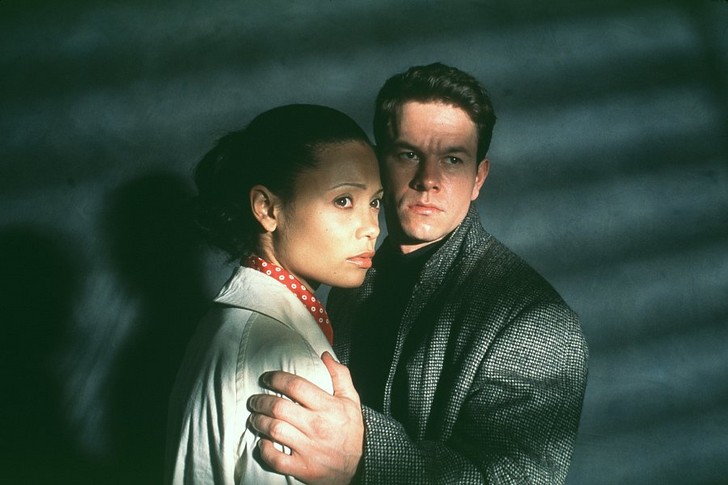 I've often referred to movies as "half-baked" but it's a rare instance
when I find one that I can label as "over-cooked."
The Truth About Charlie is one of those instances. It's
actually quite a shame because director Jonathan Demme clearly has a
good time with the material, making the types of fun films he used to
be known for before The Silence
of the Lambs, namely Something Wild and
Married to the Mob. Those films featured
off-beat comedy played out as drama, with a generous helping of style
and world music to add to the flavor. The Truth
About Charlie has those elements, and had it stuck to that which
Demme has proven he can do well, it probably would have been the type
of breezy crime caper that Charade,
which this is a remake of, had been.
I've often referred to movies as "half-baked" but it's a rare instance
when I find one that I can label as "over-cooked."
The Truth About Charlie is one of those instances. It's
actually quite a shame because director Jonathan Demme clearly has a
good time with the material, making the types of fun films he used to
be known for before The Silence
of the Lambs, namely Something Wild and
Married to the Mob. Those films featured
off-beat comedy played out as drama, with a generous helping of style
and world music to add to the flavor. The Truth
About Charlie has those elements, and had it stuck to that which
Demme has proven he can do well, it probably would have been the type
of breezy crime caper that Charade,
which this is a remake of, had been.
Charade
was director Stanley Donen's attempt to create a Hitchcockian
comedy/suspense film, similar to
North by Northwest, and both starred Cary Grant.
Jonathan Demme has already made his own homage to Hitchcock with
1979's The Last Embrace, and
knows if he did the same thing with The Truth About
Charlie he would have been redundant twice over.
Demme throws a curveball, and crafts it into an homage to the French
New Wave cinema of the 50s and 60s, with tips of the hat to directors
like Godard, Truffaut, Chabrol and Rohmer), all of whom were known for
toying with the convention of cinema. They would take very
conventional plots and fill them with unique camera angles, story
elements, and music, and as such, they developed a strong following
for those who love movies as an art-form and not just a way to tell a
story. They championed the auteur theory, proclaiming the
director as the real artist, instead of the producer or studio like
Hollywood liked to tout in those days. They also heralded
Hitchcock as an auteur who mastered the art of cinema whereas he was
just known as an entertainment director before. Truffaut and
Chabrol in particular, like Donen did with Charade,
made their own homages to Hitchcock with The Bride Wore
Black (of which the ending to The Truth About Charlie
is an homage to) and many others.
Therein lies the main problem with The Truth About Charlie,
and one which will completely lose the majority of audiences
unfamiliar with all of these artists works. Charlei
is an homage to a film that is already an homage, but switches its own
homage to films created by others whose works themselves were homages.
By doing so, Demme made film to celebrate others who celebrate films,
and the plot and characters of Charlie take a backseat
to what relates to a giant circle jerk for those who love art cinema.
Instead of a story, we have an exercise in technique and allusions so
out of place, they feel like they are forced into the storyline
artificially, and serve to make an already complicated plot even more
hard to follow.
I suppose now that I mention the convoluted plot, it's time to try to
explain what exactly it is. Thandie Newton (Mission
Impossible 2, Shade) plays Regina
Lampert, a young woman living in Paris and for a short time has been
married to the Charlie of the title. Well, she HAD been married,
as Charlie has been murdered while traveling by train, and when she
comes home to find their apartment has been ransacked, she is informed
by the police about six million dollars that is missing and is likely
to have been the reason for Charlie's demise...and she can expect
whoever did this will be after her to get it. Trouble is, the
money is no where to be found, and nothing in her possession seems to
be worth enough for Charlie to have hidden it, but the trio of goons
that follow her every move aren't going to give up easily. She
runs into another young man, an American named Joshua Peters
(Wahlberg, Rock Star), who
informally becomes her protector. But is he really a new
potential love interest or is he also interested in the money for
himself?
While The Truth About Charlie is extremely different
in style to Charade, the plot is remarkably true to
the original with the exception of the overly complicated climax.
The changes introduced near the end are actually the first true
missteps of the film, but so poorly executed and acted, that they come
close to undoing any good thing Demme had built up with such lavish
care up to that point. Had they stayed with the ending of the
original Charade, which was just as farfetched but
played out so much better, The Truth About Charlie
would probably be seen as a marvelously hip remix for a classic film,
and probably a cult favorite among many a film buff. However,
with poor casting involved, especially with a rather uncharismatic
Mark Wahlberg as the leading man and Tim Robbins (Antitrust,
High Fidelity) in what could
possibly be the worst performance of his career, the tapestry of
beautiful sights and sounds that Demme so lovingly crafts becomes
unraveled, broken to the point where this isn't just a mere misfire,
it's a tragic loss of a potential masterwork.
Although I'm not scoring The Truth About Charlie very high
because of the elements that make it a flawed endeavor, I still have
to give Demme a lot of credit for at least trying to make a great
film. Truly, the claustrophobic feel and flashy camerawork are a
marvel to behold, breathtakingly shot by veteran cinematographer Tak
Fujimoto makes the real Paris look every bit as vibrant and
mesmerizing as the fake one of Moulin Rouge!.
While Wahlberg is no Cary Grant, Thandie Newton is amazingly as
perfect for the role as the great Audrey Hepburn was, exhibiting
almost the same amount of charm and elegance required. Sadly,
these elements are wasted in a confusing plot and superficial
characters.
The Truth About Charlie
is worth a look for those who are intimately familiar with the works
of the French new wave directors and those who enjoy terrific
cinematography and stylish directing more than airtight plotting and
good acting. It's also better if you haven't seen the original
Charade, as the plot is too close to offer any real
thrills, and the reason you enjoyed the film so much, i.e. Cary Grant
and Audrey Hepburn together, are missing here. Yet, as far from
satisfying as the end result may be, what is done well is so good that
The Truth About Charlie is probably the best bad film
I've seen this year, a genuine guilty pleasure.
Qwipster's rating:







©2002 Vince Leo

 I've often referred to movies as "half-baked" but it's a rare instance
when I find one that I can label as "over-cooked."
The Truth About Charlie is one of those instances. It's
actually quite a shame because director Jonathan Demme clearly has a
good time with the material, making the types of fun films he used to
be known for before
I've often referred to movies as "half-baked" but it's a rare instance
when I find one that I can label as "over-cooked."
The Truth About Charlie is one of those instances. It's
actually quite a shame because director Jonathan Demme clearly has a
good time with the material, making the types of fun films he used to
be known for before